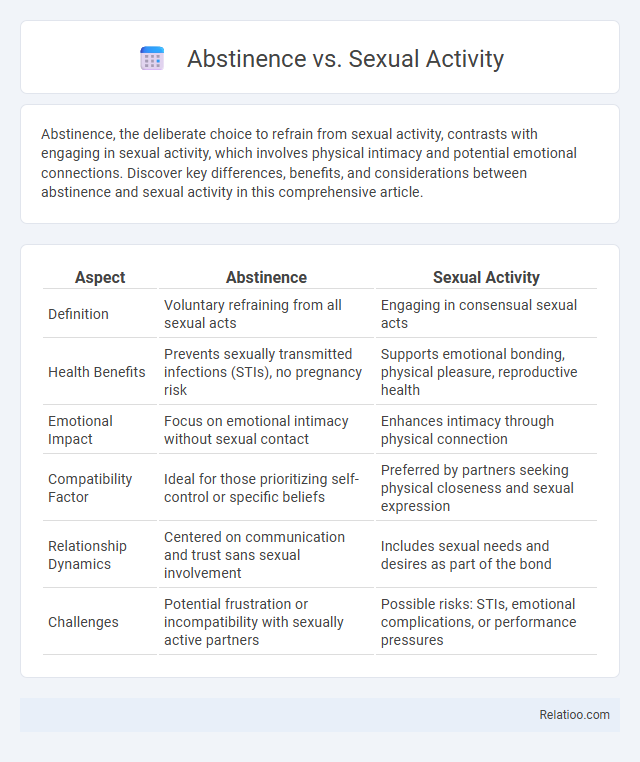Abstinence, the deliberate choice to refrain from sexual activity, contrasts with engaging in sexual activity, which involves physical intimacy and potential emotional connections. Discover key differences, benefits, and considerations between abstinence and sexual activity in this comprehensive article.
Table of Comparison
| Aspect | Abstinence | Sexual Activity |
|---|---|---|
| Definition | Voluntary refraining from all sexual acts | Engaging in consensual sexual acts |
| Health Benefits | Prevents sexually transmitted infections (STIs), no pregnancy risk | Supports emotional bonding, physical pleasure, reproductive health |
| Emotional Impact | Focus on emotional intimacy without sexual contact | Enhances intimacy through physical connection |
| Compatibility Factor | Ideal for those prioritizing self-control or specific beliefs | Preferred by partners seeking physical closeness and sexual expression |
| Relationship Dynamics | Centered on communication and trust sans sexual involvement | Includes sexual needs and desires as part of the bond |
| Challenges | Potential frustration or incompatibility with sexually active partners | Possible risks: STIs, emotional complications, or performance pressures |
Introduction to Abstinence and Sexual Activity
Abstinence refers to the deliberate choice to refrain from sexual activity, promoting physical and emotional health by reducing risks of sexually transmitted infections and unintended pregnancies. Sexual activity involves physical intimacy that can impact your well-being, relationships, and requires informed decisions regarding safety and consent. Understanding the differences between abstinence and sexual activity empowers you to make choices aligned with your values and health goals.
Definitions: What is Abstinence? What is Sexual Activity?
Abstinence refers to the deliberate choice to refrain from engaging in sexual activity, often for personal, cultural, or health reasons. Sexual activity encompasses a range of behaviors involving genital contact or stimulation, including vaginal, anal, or oral sex, with implications for physical and emotional health. Understanding these definitions is essential for addressing sexual health education, relationship dynamics, and STD prevention strategies.
Historical Perspectives on Sexual Behavior
Historical perspectives on sexual behavior reveal varying cultural attitudes toward abstinence and sexual activity, often influenced by religious, social, and legal frameworks. Ancient civilizations like Greece and Rome had diverse views, where sexual activity was sometimes celebrated, but abstinence was valued in certain philosophical or religious contexts. Your understanding of these perspectives can illuminate how modern attitudes have been shaped by historical debates surrounding morality, health, and social order.
Physical Health Impacts of Abstinence
Abstinence from sexual activity significantly reduces the risk of sexually transmitted infections (STIs) and unwanted pregnancies, contributing to better physical health outcomes. Your body's exposure to potential infections and complications related to sexual activity is minimized, ensuring enhanced reproductive and overall health. Long-term abstinence can also support emotional well-being by eliminating concerns associated with sexual health risks.
Physical Health Impacts of Sexual Activity
Sexual activity has been linked to numerous physical health benefits, including improved cardiovascular health, enhanced immune function, and reduced stress levels. Abstinence eliminates risks related to sexually transmitted infections (STIs) and unintended pregnancies, offering a clear advantage for physical health safety. Your choice between abstinence and sexual activity significantly influences your overall physical well-being and health outcomes.
Psychological Effects: Abstinence vs Sexual Activity
Abstinence often leads to increased self-control, reduced anxiety, and improved mental clarity by avoiding potential emotional complications associated with sexual activity. Sexual activity releases endorphins and oxytocin, which enhance mood and promote intimacy but can sometimes result in emotional vulnerability or stress when relationships are unstable. Psychological effects vary based on individual experiences, with abstinence generally fostering emotional stability and sexual activity offering mood elevation through biochemical responses.
Social and Cultural Influences on Sexual Choices
Social and cultural influences heavily shape your sexual choices, affecting the decision between abstinence and sexual activity. Norms, religious beliefs, and peer pressures create frameworks that define acceptable behavior, often reinforcing abstinence or encouraging sexual exploration. Understanding these influences helps navigate personal values and societal expectations regarding sexuality.
Relationship Dynamics and Sexual Decision-Making
Abstinence and sexual activity influence relationship dynamics by shaping communication patterns and emotional intimacy levels. Your choices regarding abstinence affect how trust, mutual respect, and boundary setting evolve within the partnership. Understanding these factors empowers informed sexual decision-making, fostering healthier and more satisfying relationships.
Risks and Benefits: A Comparative Analysis
Abstinence eliminates the risk of sexually transmitted infections (STIs) and unintended pregnancies, providing complete protection without the need for additional contraception. Sexual activity offers benefits such as emotional intimacy and physical pleasure but carries inherent risks including STIs and potential unplanned pregnancies, which can be mitigated through safe sex practices like condom use and regular testing. Comparing both approaches highlights abstinence as the only 100% effective preventive method, while sexual activity requires responsible measures to balance benefits and reduce health risks.
Choosing What’s Right: Navigating Personal Values and Beliefs
Choosing what's right between abstinence and sexual activity involves reflecting on your personal values, beliefs, and emotional readiness. Understanding the potential physical, emotional, and social consequences helps you make informed decisions aligned with your well-being. Respecting your boundaries and communicating openly with partners ensures that your choices support healthy relationships and self-respect.

Infographic: Abstinence vs Sexual Activity
 relatioo.com
relatioo.com